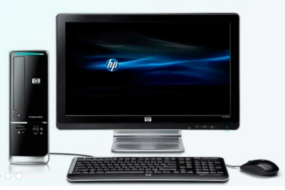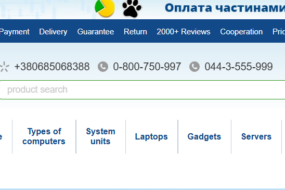
An excellent choice for business users — but not everyone
Lenovo maintained its 5th place spot this year thanks to a wide selection of options and a handful of reliable products – most notably its ThinkPad line of laptops. Somehow, the company managed to improve upon what was already the best business laptop you can buy. However, the company is bogged down with a number of mediocre mid-tier systems that don’t stand out in a competitive landscape. The company could also stand to improve its tech support. However, there’s hope on the horizon with several innovative products set to launch later this year or the beginning of next. The future is bright for Lenovo provided it keeps the ThinkPads and innovation coming.
Lenovo’s Key Strengths
- An empire of ThinkPads: Lenovo continues to make some of the best business laptops in the business. A tantalizing mix of power, performance, durability and security ThinkPad laptops are hard to beat. The company even mixed things up with some aluminum systems.
- An expansive line of laptops: Lenovo has amassed a library of laptops which hit just about every use case and budget. Whether you’re looking to get into gaming, need something on a low budget or are desperate for a business laptop, Lenovo has got something for you.
- Great online tech support: While Lenovo’s tech support isn’t perfect, the company boasts one of the best websites we’ve ever seen from a laptop brand. Tech support was also quite helpful, even though we had a couple of issues with their phone service representatives providing us some incorrect information.
Lenovo’s Main Weaknesses
- Same old designs: A lot of Lenovo laptops look far too much alike. And while there are some standouts, it’s not enough to overcome the sameness.
- Lack of innovation: Lenovo’s greatest weakness this time around is a lack of novel ideas. Although the company is releasing the world’s first foldable PC with the ThinkPad X1 Fold soon, the company didn’t have too much to offer.
Reviews (31/40)
Lenovo has a lot of exciting new products to show us in the next few months, including the first folding display laptop, the ThinkPad X1 Fold, and the rumored ThinkPad X1 Nano, a Dell XPS 13 competitor. It will need these to be a hit because the company remains near the bottom of our reviews category.
Don’t worry, Lenovo still makes some great business laptops, including our top pick, the ThinkPad X1 Carbon, and its convertible equivalent, the X1 Yoga. Speaking of Yoga, Lenovo’s flagship consumer products, like the Yoga C940 and Yoga C740, are reliably great. We also need to give a shout out to the Chromebook Duet, a fantastic addition to the budget Chromebook market.
However, Lenovo’s midtier and gaming brands are hit-or-miss. Some of the IdeaPads could use attention, and Legion, Lenovo’s gaming brand, is in the midst of a revamp, so we’ll check back in next year to see how it fares.
Design (12/15)
If Lenovo’s design could be described as a book title, it’d probably be 50 Shades of Gray (and Black). The company is falling into the trap of some of its biggest competitors: sameness. This comfortable rut means that you’ll get a fair amount of ThinkPads like the E490, X1 Carbon (7th Gen) and X1 Extreme Gen 2. Thankfully, these laptops augment that sameness with serious MIL-SPEC certification. The same can’t be said for the IdeaPad 320 and IdeaPad 330.
But that’s not to say there weren’t any bright spots. Take, for instance, the inexpensive Chromebook Duet with its eye-catching, two-toned rear panel and a magnetic attachable fabric keyboard cover that acts as a kickstand. The Yoga C940 shows Lenovo is still game to tweak the Yoga formula, cleverly integrating a speaker bar into the 360-degree hinge. And this is the year Lenovo took a few steps away from carbon fiber on ThinkPads, decking out X1 Yoga (2019) in premium aluminum. And then there’s the ThinkBook 13s, which splits the difference between the IdeaPad and ThinkPad and weighs in at a mere 2.9 pounds.
For gaming, you have the Legion Y545, whose industrial design and clean, attractive lines, present a nice contrast to many of its flashier counterparts.
Support and Warranty (14/20)
Lenovo has one of the most useful websites we’ve tested from a brand, with an easy-to-navigate user interface and a bunch of helpful tools to resolve your issues. The website can even detect your product through its Service Bridge tool and swiftly download a program that could diagnose the PC to fix our issues.
The tech support representatives were also quite helpful, even though they often took their time to assist us. However, Lenovo’s phone service was a journey of being put on hold, transferred and denied due to an insufficient warranty. We also had an agent tell us we couldn’t update the laptop’s BIOS and provided us with incorrect information implying that it would be harmful to the PC.
Lenovo laptops come with 12-month warranties automatically and certain products like ThinkPads can come with 36 months of warranty depending on the model. This standard warranty does not cover shipping cost or accidental damage, but there are most expensive plans which cover this.
Innovation (6/10)
Laptop makers better watch out for Lenovo — the Hong-Kong based company is on the verge of leaving its competitors in the dust with its innovative visions. Lenovo is poised to release the world’s first foldable PC this fall with the ThinkPad X1 Fold.
The future of Lenovo screams innovation, but in analyzing the league of Lenovo laptops we’ve reviewed in the recent past — especially the tech giant’s well-received fleet of business notebooks such as the ThinkPad X1 Carbon — Lenovo’s notebooks are not the most innovative devices on the market. On the plus side, though, Lenovo is the mastermind behind many solid, durable, respected laptops that are often highly recommended by laptop enthusiasts.
With most of Lenovo’s laptops targeting the business crowd and minimalist-loving folks who love powerful hardware wrapped in understated designs, perhaps innovation wasn’t Lenovo’s number one priority in recent months. The company simply wanted to update and enhance its high-performing, clean-cut laptops, and that is perfectly fine with us.
Value and Selection (14/15)
Lenovo offers laptops in just about every category, taking care of all kinds of consumers. The only laptop it doesn’t have in its selection is a rugged one, and I’m not talking about something that’s MIL-SPEC tested, I’m thinking more along the lines of the Dell Latitude 5420 Rugged level of rugged.
If you’re looking for Windows 10 consumer products, you can choose from the Lenovo ThinkBook 13s ($629) or Lenovo Yoga C940 ($1,009), which covers the mainstream and premium range, respectively. If you need a budget laptop for under $400, you can check out Lenovo’s IdeaPad 100 Series (we haven’t reviewed any of them, but they are available). Lenovo also makes great affordable Chromebooks, such as the Lenovo Chromebook Duet ($279).
Lenovo is renowned for its business laptops, and it has a great selection, including the Lenovo ThinkPad X1 Carbon ($1,553) and the Lenovo ThinkPad X1 Yoga ($1,199). Both of which offered excellent displays, fast performance and class-leading keyboards. We haven’t reviewed a Lenovo workstation in the past year, but the company offers a wide range of them in its ThinkPad P Series.
Lenovo’s Legion Series covers the gaming area, and we’ve reviewed a budget gaming laptop from that selection, the Lenovo Legion Y545 ($799), as well as a mainstream gaming laptop, the Lenovo Legion 5i ($1,099), both of which were solid entries. If you want a premium gaming machine, check out higher-tiered configurations of the Legion 7i, which is configurable with up to an Nvidia GeForce RTX 2080 Super GPU for a costly $2,749.
- Scorecard and Winners
- Acer
- Alienware
- Apple
- Asus
- Dell
- HP
- Lenovo
- Microsoft
- MSI
- Razer
- Samsung








